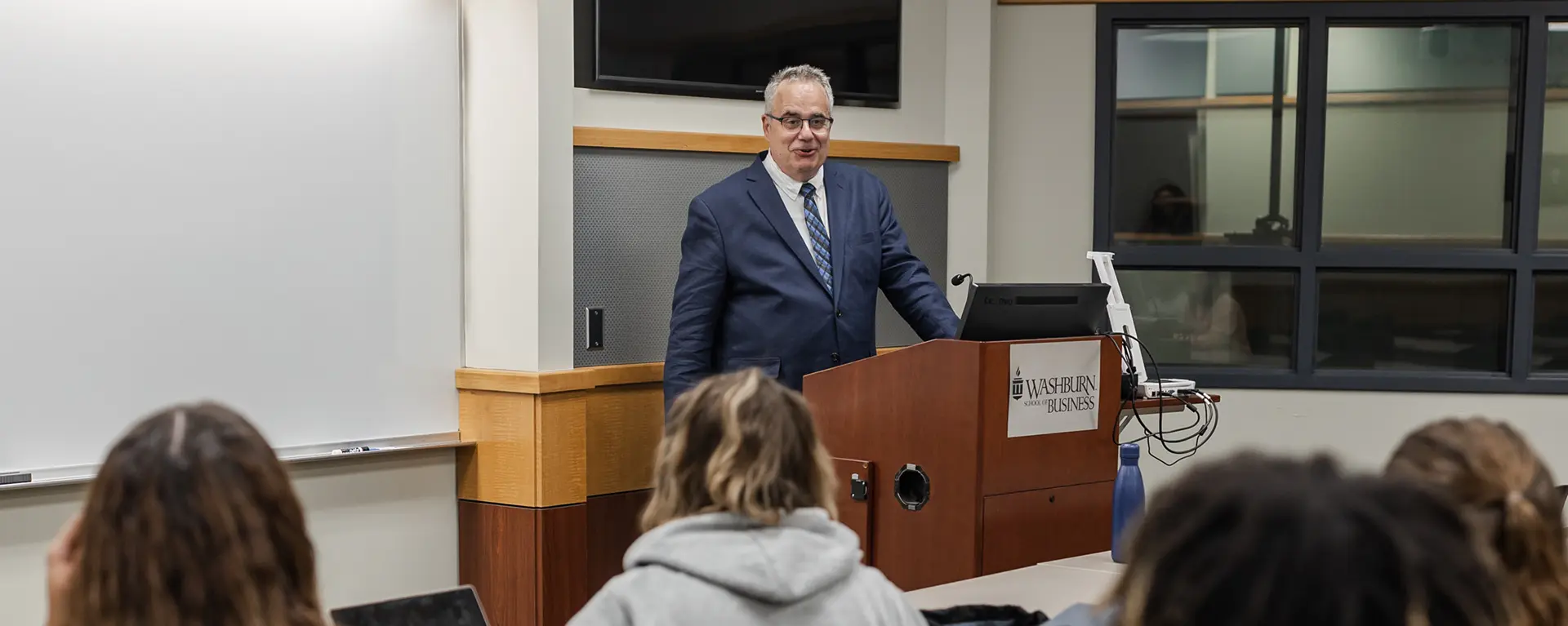
Mission, Ethics and Values
Our Mission
The Washburn University Brenneman School of Business provides knowledge and personalized experiences to engage students who will enhance the economic vitality of businesses in the region and beyond.
The Brenneman School of Business is characterized by these actions:
- Uses flexible delivery and small interactive classes to prepare students for challenges of a dynamic collaborative environment.
- Provides students with distinctive opportunities for personal growth through transformative activities and engagement with local and global stakeholders.
- Produces research that enhances our classroom teaching, assists practitioners, and advances knowledge in business disciplines.
- Stimulates economic development of the region through our Small Business Development Center and other collaborative partnerships.
- Fosters integrity, mutual respect, and ethical behavior as requisites to business practice.
Stakeholders of the Brenneman School of Business, be they faculty, students administrators or others, should expect their interactions with other stakeholders and stakeholder groups to be guided by the following principles:
- Honesty: Honesty is the cornerstone for the other fundamental program values. There can be no trust, fairness, respect, integrity or responsibility without honesty. Honesty creates the possibility for quality teaching, learning, academic research and communication between individuals.
- Trust: Trust results from a culture of honesty. Trust provides the foundation for an environment that nourishes creativity and risk-taking in teaching, learning and scholarship, and is essential to Washburn University's pursuit of quality human development and "learning for a lifetime."
- Fairness: A sense of fairness emerges when standards, policies and procedures are equitable, clear, and in the best interest of all program stakeholders. Without fair processes, the learning environment cannot sustain trust and honesty. Fairness insures that all stakeholders have the opportunity to succeed, and provides a foundation for mutual respect among stakeholders.
- Respect: A University environment focused on the creation and transmission of knowledge requires interaction and participation by all stakeholders. Quality interaction is facilitated when stakeholders display respect for one another. When stakeholders are treated fairly and honestly, they are better able to trust one another, which leads to a culture of mutual respect.
- Integrity: Stakeholders of the Brenneman School of Business conduct themselves with integrity when teaching, learning, research, communication and other interactions are conducted in accordance with the principles of honesty, trust, fairness and respect.
- Responsibility:
- Faculty act responsibly when they:
- Maintain currency in their field
- Freely share their knowledge with students
- Develop coursework that is focused, relevant, coherent and adds value to students' career skills and ambitions
- Critically assess students' work in a constructive and rigorous manner
- Challenge students to grow intellectually and professionally
- Create an environment that is conducive to learning
- Assist students in understanding the requirements and expectations of their degree programs
- Students act responsibly when they:
- Properly prioritize their commitments to the program
- Manage their work and family responsibilities so they may attend class and be fully engaged in other program activities and requirements
- Understand the requirements and expectations of their degree programs and plan their class schedules consistent with these expectations
- Accept criticism in a professional manner and with the understanding that such feedback is designed to improve their business skills and critical thinking
- Arrive to each class session prepared
- Contribute substantively to the classroom dialogue
- Approach the course material thoughtfully
- Faculty act responsibly when they:
GET IN TOUCH WITH Brenneman School of Business
Physical Address
1729 SW MacVicar Avenue
Topeka, KS 66604
Mailing Address
1700 SW College Avenue
Topeka, KS 66621
Connect
785.670.1308
Fax: 785.670.1063
business@washburn.edu
![]()
![]()
![]()

